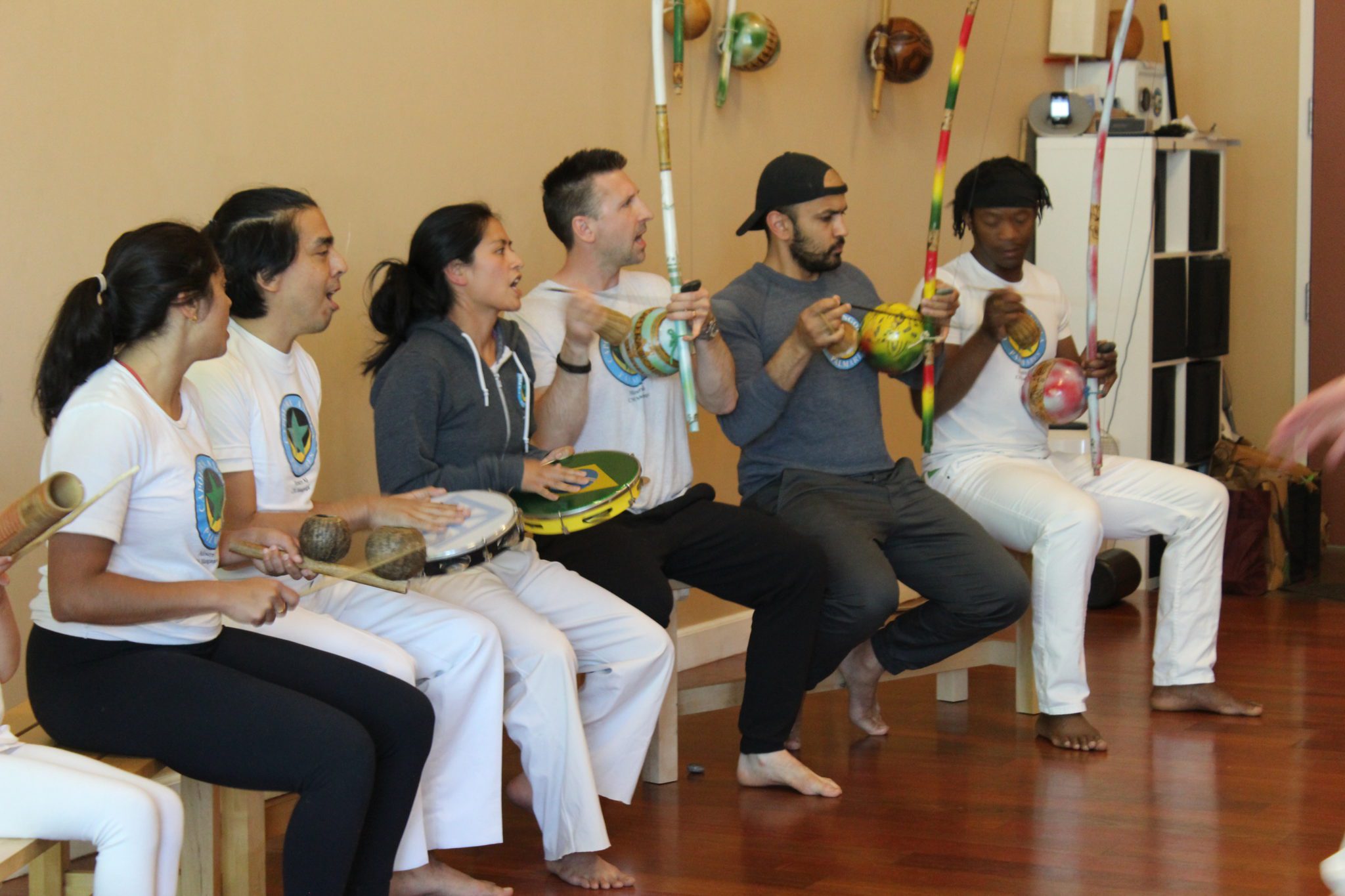 Syed (seated second from the right) plays berimbaus with the group
Syed (seated second from the right) plays berimbaus with the group 
Listen: Origin Story – Seattle Capoeira Center
If you haven’t heard of Capoeira—an African cultural art from Brazil that combines self-defense, dance, acrobatics and music—then Seattle Capoeira Center owner Syed Taqi wants to change that. “The goal is like, thousands of people playing Capoeira. Hundreds of people walking around with berimbaus, like [people walk around with] yoga mats.”
Syed Taqi is Syed’s citizen name, as he puts it—if you train at Seattle Capoeira Center, you may know him as Contramestre (Assistant Master) Mangangá. Capoeira is Syed’s life passion: he has been teaching Capoeira in Seattle since he was 19 years old, and is the highest-ranked Seattleite in Capoeira. When he was a teenager, Syed left his home in Beacon Hill to train in Brazil with his mentor, Grande Mestre (Grand Master) Nô, with the goal of returning home to share Capoeira with his community.

Practicing Capoeira with his sister in Seattle, Syed found that they stuck out in their class, which was mostly comprised of white, middle class men. “Me and my sister, being South Asian Muslims, didn’t really fit into the group,” Syed remembers. “My sister, you know, she quit doing Capoeira, and she was like, ‘One day, when you become a master, I’ll come back and do Capoeira.’ She wanted to be in a place where she could practice Capoeira in a safe space for women, especially women of color.”
Several years later, Syed became an instructor of the Capoeira Angola Palmares group under Grande Mestre Nô. With Grande Mestre Nô’s permission, Syed then formed his own Capoeira group, which evolved into the Seattle Capoeira Center when Syed signed the lease on the business’s studio in 2014. Seattle Capoeira Group originated out of the original Capoeira school that formed in Seattle during the 1980s under Mestre Elísio. Seattle’s Capoeria tradition is one of the longest standing in the United States.

The location of the Seattle Capoeira Center—right by the Mount Baker light rail station on Rainier Ave South—is important to Syed because it maintains his connection to the community he grew up in. “It motivated me, because this is where I’m from,” he says. “I’m born and raised in Chicago, but I grew up on Beacon Hill. And I just thought me starting a business here would be meaningful.”
Syed seized the opportunity to lease the studio at 2909 Rainier Avenue South and began to grow his business from there. “It’s not easy,” he says. “I spend a lot of time away from my family trying to figure out how to promote the business, how to create and cultivate community. This isn’t a retail store where people come in for 20 minutes and then they leave, this is transmitting a cultural tradition, and to do it in an honest, authentic way takes a lot of time, because there is no real blueprint for a business like this. You can’t really go to school to learn how to build community.”
Part of the challenge for Syed is spreading the word about Capoeira and convincing Seattleites to value it amongst dozens of other fitness options, while at the same time maintaining the existing community and deep respect for the practice. Syed draws a comparison to the ease of selling a yoga class in Seattle: “Yoga has been colonized in the city and all over. White people value that, you know, they’ll drop thousands of dollars. With Capoeira, it’s a struggle.”

Syed built the student base at Seattle Capoeira Center slowly over the years, in part through investing in advertising and keeping membership fees competitive, but also by doubling down on his commitment to his community. “You gotta find your niche,” he says. “As a fitness center, I can’t compete with 24 Hour Fitness, I can’t compete with the Bouldering Project, I can’t compete with some of these yoga schools. So I narrowed down the niche to community building. That’s something these other places can’t do as well as I can.”
Syed has relied on his community in learning how to run the business as well. “Throughout the years a lot of my students have helped me at different stages of the business,” he says. “Definitely my wife helps me a lot. She knows a lot of the HR, how to treat people right, and how to cultivate community. She’s probably helped me more than anyone.” Syed also found some business education through Washington CASH, and took advantage of free business resources from the Seattle Public Library.
If you’re planning to start your own business, Syed recommends focusing on your niche audience, just like he and others have done. “My friends at The Station have their niche demographic that they target to, my friends at That Brown Girl Cooks, they have their niche that they target to. So these businesses that are run by people of color that are successful, they’re tapping into spaces that aren’t occupied by others,” he says.
More than anything else, Syed invites you to come be part of the Seattle Capoeira community. “Stop by a Sunday Roda session, from 2-4:00pm. That’s where we celebrate Capoeira and maintain the tradition.” The weekly roda is a chance for all families to come experience Capoeira, whether you’re a regular player or you just want to watch and learn.
You’re also invited to Capoeira Life 3.0 on May 26, 2019 where you’ll have the chance to join in on a basic class, watch a live Capoeira demonstration with music, and celebrate Syed’s promotion from Contramestre to Mestre (Master)—a huge milestone, as Syed will be the second-ever North American student of Mestre Nô to become a Mestre. You can also sign up for a free week of classes at Seattle Capoeira Center, and follow them on Instagram, Facebook and Twitter.
Interested in small business resources and support? Check out our website or reach out to us anytime.